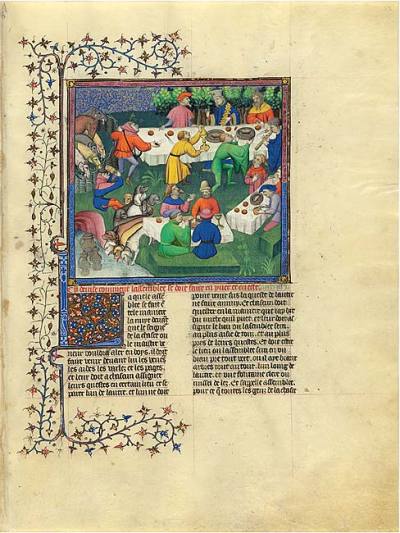When Edward Langley, 2nd Duke of York, translated Gaston’s Le livre de chasse (1389) into English, French was still the language of the Court and elsewhere. He renamed it The Master of Game.* Like Chaucer, Edward’s translation decided to write in English rather than French or Latin.
“And the place where the gathering shall be made should be in fair mead well green, where fair trees grow all about, the one far from the other, and a clear well or beside some running brook. And it is called gathering because all the men and the hounds for hunting gather thither, for all they that go to the quest should all come again in a certain place that I have spoken of. And also they that come from home, and all the officers that come from home should bring thither all that they need, everyone in his office, well and plenteously, and should lay the towels and board clothes all about upon the green grass, and set divers meats upon [in great plenty] after the lord’s power. And some should eat sitting, and some are standing, and some leaning upon their elbows, some should drink, some laugh, some jangle, some joke, and some play . . . And when they shall have eaten, the lord shall devise where the relays shall go, and other things, which I shall say, more plainly, and then shall every man speed him to his place . . .”
Featured Image: Edward’s text does not have an illustration of the hunters’ assemblée. The assemblée pictured here is from 15th-century text of Gaston’s Le livre de chasse.
See Duke of York Edward de Langley, The Master of Game. (1413). Edited by William A Baillie Grohman and F. Baillie-Groham. London: Ballantyne, Hanson, 1904. Reprint Philadelphia: University of Pennsylvania Press, 2005; Henry L. Savage, “Hunting in the Middle Ages.” Speculum 8:1 (1933): 30-41. The full text is available at https://archive.org/stream/masterofgameoldexx00edwa/masterofgameoldexx00edwa_djvu.txt
*He died fighting the French at Agincourt in 1415 (an event later commemorated by Shakespeare in Henry IV(Part 3).

